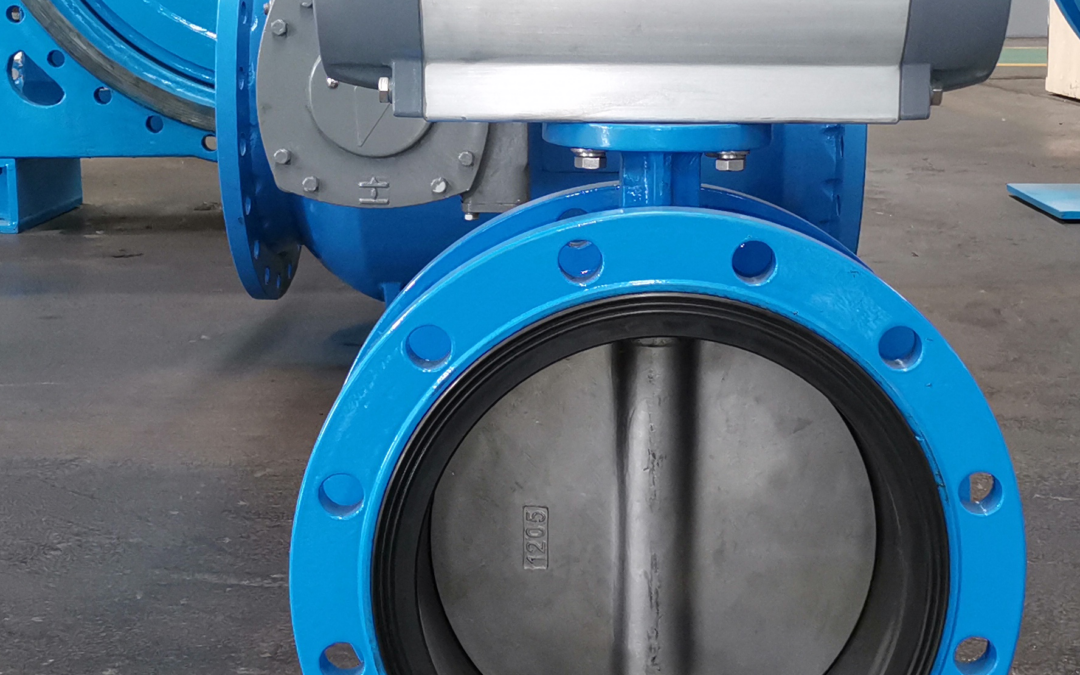
Apr 30, 2024 | Nachricht
At the core of industrial wonders, precision pairs with endurance, heralding the unsung heroes: butterfly valves. Not merely ordinary valves, but specifically those that represent innovation and efficiency stand out: soft sealing butterfly valves, elektrische pneumatische Absperrklappen, and pneumatic actuator butterfly valves. Each is vital in industrial fluid control, ensuring seamless, efficient operations. Let’s explore their world, where each turn is critical, and see how they maintain industry’s lifeblood with unparalleled precision and dependability.
Soft Sealing Butterfly Valve: Championing Zero-Leak Operations
Der weichdichtende Absperrklappe excels with its unique sealing method. It features a flexible, soft seat crafted from materials such as EPDM, NBR, or PTFE. Its design shines in tight-sealing applications, crucial for preventing leaks of fluids or gases.
In What Applications Does the Soft Sealing Butterfly Valve’s Design Excel?
Soft sealing butterfly valves shine in applications demanding tight closure, low leakage, and careful handling of sensitive fluids. Here’s where they stand out:
- Hygienic and Pharmaceutical: Using FDA-approved materials, they ensure cleanliness and resist chemicals.
- Chemische Verarbeitung: They withstand corrosive substances, ensuring containment and preventing cross-contamination.
- Water Treatment: They’re effective in treatment and HVAC systems, offering leak-tightness across various conditions.
- Pulp and Paper: Ideal for abrasive fluids, they provide durable shutoff, cutting maintenance costs and downtime.
- Food and Beverage: They protect food safety by blocking contaminants and reducing product loss during processing.
- Power and HVAC: Handling high temperatures and pressures, they’re used in steam and cooling systems with minimal leakage.
- Marine and Offshore: Their robust design suits harsh marine environments, resisting corrosion from saltwater.
Electric Pneumatic Butterfly Valves: Innovation Meets Control
Electric pneumatic butterfly valves merge the precision of electric actuators with pneumatic efficiency. They’re fitted with an electric motor that moves the actuator, thereby adjusting the valve disc’s position. Precise control is enabled by the electric actuator, crucial for processes requiring consistent flow rate adjustments.
How Do Electric Pneumatic Butterfly Valves Offer Accurate Control and the Convenience of Remote Operations?
Electric pneumatic butterfly valves present a formidable combination of precise control mechanisms and the convenience of remote operation capabilities. These two features are central to their appeal in automated industrial systems:
Accurate Control
- Precision Positioning: Electric actuators are known for their ability to accurately position the valve disk to control the flow rate through a pipeline. They can modulate the valve’s opening to very fine degrees, allowing for granular control over the process media’s movement. This precision is especially crucial in applications where the exact flow rate must be maintained to ensure process quality, such as in chemical dosing or temperature regulation in HVAC systems.
- Modulation Capability: Unlike manual or solely pneumatic solutions, electric actuators can precisely modulate the valve position based on feedback from sensors in the system. This feedback loop ensures the valve can adjust to changes in the process conditions in real-time, optimizing the flow and pressure conditions as required.
Convenience of Remote Operations
- Electric actuators integrate smoothly with digital control systems, like PLCs and DCS. This integration enables remote valve control, adjusting flow from afar. It allows for management without physical presence at the valve site.
- Electric pneumatic butterfly valves support real-time monitoring and data logging through control system interfaces. They enable continuous tracking of valve and process performance, sending alerts for anomalies and logging data for analysis. This aids in predictive maintenance, allows remote management, enhances efficiency, and reduces manual inspections.
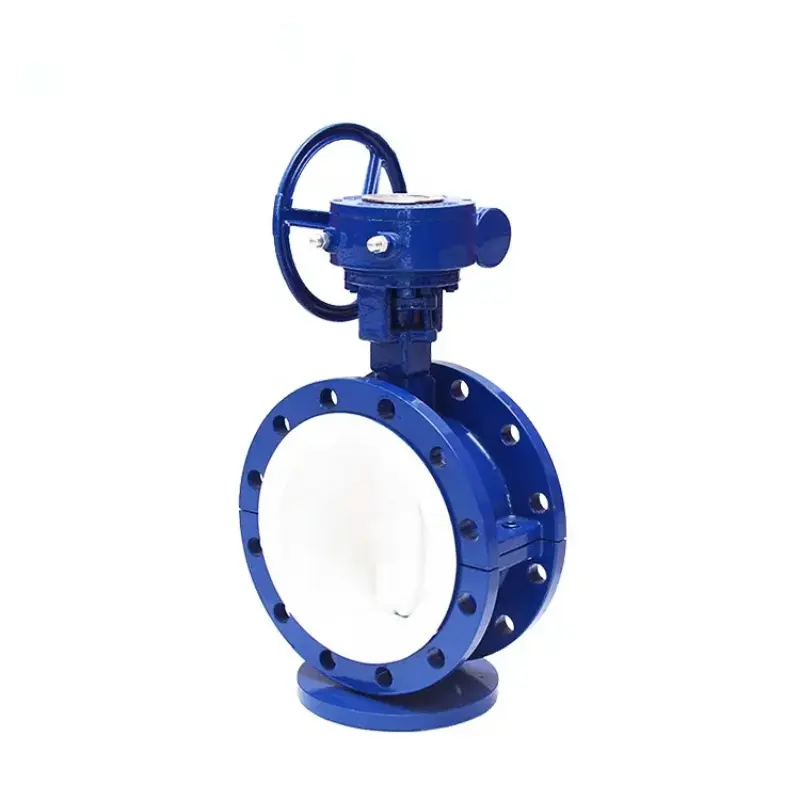
Pneumatic Actuator Butterfly Valves: The Power of Air Pressure
When speed and toughness in tough environments are essential, pneumatic actuator butterfly valves stand out. By using compressed air for movement, these valves guarantee strong performance, particularly in settings with high flow rates and corrosive substances.
Pneumatic actuators are favored in places with ignition risks, as they operate without electricity and are naturally explosion-proof. Furthermore, their straightforward design typically leads to reduced maintenance expenses and a prolonged lifespan. These valves are frequently used in chemical processing, the petrochemical industry, and bulk material handling.
What Are the Advantages of Pneumatic Actuators Over Other Types of Actuators?
Pneumatic actuators boast several notable benefits over their electric counterparts:
Strong Environmental Adaptability:
- Explosion-proof Safety: Suited for flammable and explosive environments, they work with air, reducing spark risks and meeting strict explosion-proof standards.
- Resilience to Harsh Conditions: More reliable and durable than hydraulic, electronic, and electrical controls in dusty, magnetic, radioactive, and vibrating conditions, they’re less affected by external factors.
Fast Response and High Dynamic Performance:
- Quick Action: They respond swiftly to control signals, excelling in applications requiring frequent or emergency shutoff.
- High Acceleration: They often achieve higher acceleration than electric actuators, reaching desired speeds and pressures quickly.
Strong Overload Capacity:
- Maintenance-free: Designed for no maintenance, they don’t need oil changes or extra lubrication, with a life expectancy of up to one million cycles.
- Adjustable Torque: By adjusting air pressure, their working pressure and output torque can be easily increased, handling overload situations well, especially when valves face increased startup torque due to deposits or sintering.
Economic and System Simplification:
- Cost-effective: For on/off or manual valve operations, like in water and wastewater treatment, they offer economic benefits due to low cost, simple structure, and less assembly complexity.
- Reduced Monitoring and Control Needs: Compared to electric actuators, they only require basic end position sensing and air source treatment, eliminating the need for complex monitoring like over-temperature, torque, or frequency conversion, thus simplifying the overall system.
The triad of soft sealing, elektrisch pneumatisch, and pneumatic actuator butterfly valves introduces a suite of forward-thinking solutions tailored to meet the varied demands of modern industrial endeavours. By offering distinctive advantages in seal integrity, control sophistication, and operation speed, these valves empower professionals to refine process management, elevate operational efficacy, and guarantee safety in myriad applications. Please contact us if you are interested. We look forward to hearing from you.
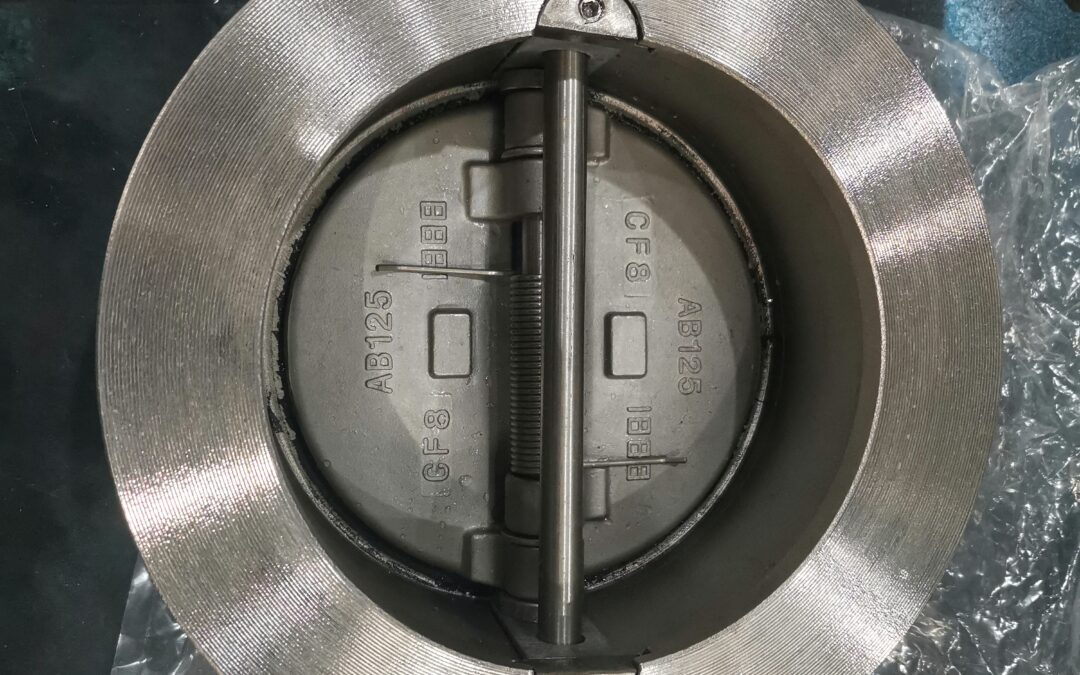
Apr 24, 2024 | Nachricht
Seeking a durable, efficient check valve for your fluid system? Navigating the intricate industrial valve landscape, you understand the significance of selecting the appropriate model. If not, let’s delve into the world of stylish flange double door check valve, China lift check valve, and single disc wafer check valves today.
Flanged double door check valve, China lift check valve, and single disc wafer check valves each offer unique features for specific uses. Understanding these can save time and resources. This knowledge also enhances system performance and clarifies the benefits and specs of these valves.
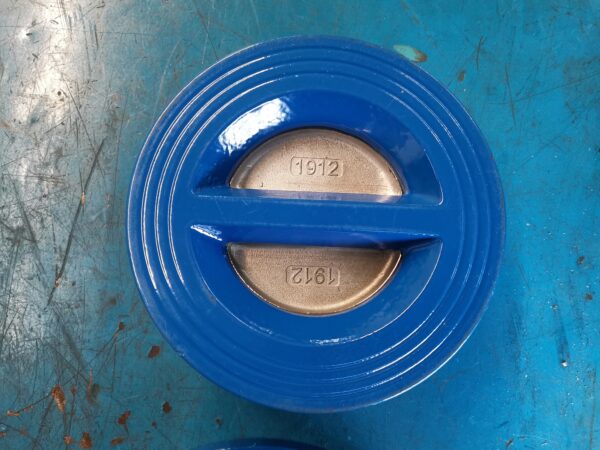
Flange Double Door Check Valve: The Dual Protector
Imagine you’re sipping a cold drink through a straw. You want the liquid to come up the straw and into your mouth, right? A flange double door check valve is like a smart straw for big pipes—it makes sure stuff (like water or gas) only flows one way. It’s got two flappy doors that open up when the good stuff is moving the correct way through the pipes. But if that flow tries to reverse? Nope, the doors slam shut, saying “Not today!” This means everything stays safe and only goes where it should.
Why is it called “flange”? Well, think of flanges as the hands that hold the valve in place on the pipe, nice and tight, so it doesn’t wiggle or leak.
Also, in simple terms, a flange double door check valve is like having a smart, one-way only door for what flows through pipes—keeping everything moving smoothly in the direction it’s supposed to. It’s one clever piece of kit in the world of pipes and water!
China Lift Check Valve: The Rising Star
Hey, I want to talk about this cool piece of equipment, the China Lift Check Valve. Its working principle is really straightforward, yet it’s super effective. Basically, when fluid flows in one direction, the valve automatically opens, allowing the fluid to pass through. Once the fluid tries to flow back, the valve snaps shut like an automatic door, preventing reverse flow.
It’s ingeniously designed with a conical component called the disc, which moves up and down inside the valve seat. As the fluid pressure increases, overcoming the weight of the disc, the disc is lifted, opening the passage. But as soon as the flow rate decreases or stops, the disc falls back down by gravity, sitting snugly on the seat to stop the fluid from backflowing. This is great for protecting upstream equipment, like pumps, usw.
One advantage of China’s lift check valve is that it occupies less space and is quite easy to install, not as complex as some larger valves. And based on where they are used, they can be made to withstand high temperatures, corrosion resistance, essentially capable of handling various harsh conditions.
In short, this valve acts as a little guardian in the piping system, ensuring water or other fluids flow in only one direction. It’s especially suitable for situations that demand space efficiency and energy savings. Plus, it’s economical and offers great value, making it popular in the market.
Single Disc Wafer Check Valve: The Space Saver
A Single Disc Wafer Check Valve, as the name suggests, has a single circular disc at its core. It’s kind of like a gatekeeper for your pipes, making sure the fluid flows forward without any backward sneakiness. Der “wafer” part refers to its slim, space-saving design. Unlike traditional swing check valves or ball check valves that might be bulkier, wafer check valves are thin and compact, so they easily sandwich between pipe flanges using just a pair of bolts. This makes them ideal when you’re dealing with tight spaces or need to save on installation costs.
What Are the Advantages and Disadvantages of Single Disc Wafer Check Valve compared with Flange Double Door Check Valve, China Lift Check Valve
Single Disc Wafer Check Valve
Pros:
- Compact and Lightweight: With just one disc, these valves are more compact and lighter.
- Ease of Installation: Thanks to its simple design, it’s quite easy to install and maintain.
- Versatile: It can be used in both large and small diameter pipelines.
Cons:
- Poorer Seal: A single disc might not seal as tightly as a double disc.
- Durability Issues: Being single-disc, it might not last as long as double-disc or lift check valves.
Flange Double Door Check Valve
Pros:
- Better Sealing: The double-door design provides a better seal.
- Quick Response: The double disc design reacts quickly to flow reversal, reducing water hammer effects.
Cons:
- Larger Size: It’s bulkier than a single disc valve, requiring more space for installation.
- Higher Cost: The more complex structure could mean higher manufacturing costs.
China Lift Check Valve
Pros:
Reliable Structure: The lift-check design is simple with fewer components, increasing reliability.
Easy Maintenance: Fewer components also mean easier maintenance.
Cons:
- Flow Resistance: May have higher fluid resistance compared to wafer or double-door check valves.
- Vertical Installation Constraints: Unlike some wafer or double-door valves, there may be more limitations on vertical installations for lift check valves.
Every valve type comes with its own set of benefits, and the choice largely hinges on the particular needs and design criteria of the system. I trust this piece has been informative. For further insights, feel free to reach out or visit our website. We’re eager to assist you.
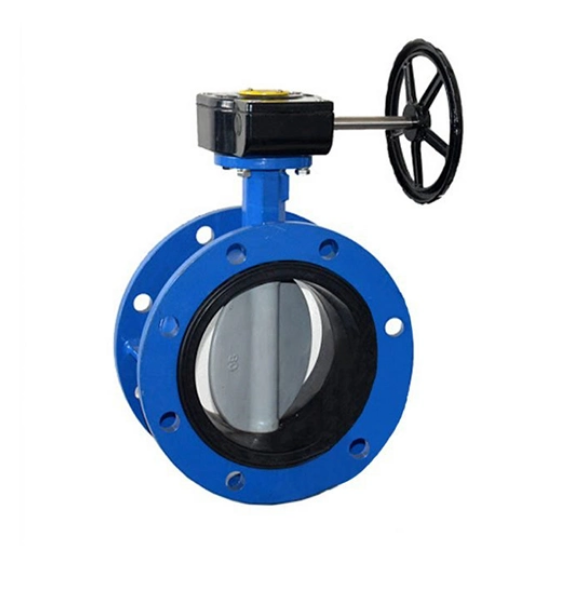
Apr 18, 2024 | Nachricht
In fluid control systems, precision and efficiency are paramount. Butterfly valves, known for their versatility, ensure consistent flow management across various sectors. The GGG50, extended stem, and concentric disc butterfly valves stand out among their peers. To assist in your selection, an examination of their characteristics, uses, and distinctions is presented, tailored to your specific flow control requirements.
GGG50 Butterfly Valve: Precision in Performance
Crafted from high-grade ductile iron, the GGG50 butterfly valve is renowned for its robustness and corrosion resistance. Its design features a disc mounted on a central axis, allowing for precise fluid control. Employed across water networks, HVAC, and various industrial settings, the GGG50 valve excels in moderate pressure and temperature conditions. Chosen for its adaptability and longevity, it serves a spectrum of industrial applications.
Design and Operation
A GGG50 butterfly valve consists of a circular disc (the “butterfly”) mounted on a rotating shaft or stem, which is perpendicular to the flow path. When the valve is open, the disc is rotated parallel to the flow, allowing fluid to pass through with minimal obstruction. In the closed position, the disc is turned to a position perpendicular to the flow, effectively blocking it. The disc tightly seals against a durable EPDM, NBR, or equivalent elastomer seat, guaranteeing leak-proof closure in the valve’s inactive state.
Compactness, leichtes Design, swift operation, and reduced maintenance needs – attributes that render these valves highly preferable over alternative types. Furthermore, they inherently offer bidirectional flow cessation, thus proving ideal for systems experiencing reversed flow directions.
Proper Usage of GGG50 Butterfly Valves
Installation
- Installation directed by flow markings or instructions: Valve correctly oriented.
- Misalignment stress prevented: Valve-to-pipe alignment kept proper to safeguard valve body and seals.
- Valve support provided sufficiently: Strain on valve-to-pipe joint minimized, seating surface integrity maintained, especially for larger valves.
- Flange connections: Use appropriate gaskets, bolts, and torque values in accordance with the valve and pipeline specifications.
Betrieb
- Manual operation: Depending on valve design, it’s rotated clockwise or counterclockwise for valve opening or closing. Excessive force is prohibited; leverage tools are only used when specifically suggested by the manufacturer.
- Valve operation through actuation: When fitted with an electric, pneumatic, or hydraulic actuator, the valve is operated by the control system following manufacturers’ guidelines for both actuator and valve.
Extension Stem Butterfly Valve: Accessible Control at Your Fingertips
Extension Stem Butterfly Valve, a specialized variant of the conventional butterfly valve, is designed with an elongated stem that extends beyond the standard length, offering unique advantages and distinctive selling points for specific applications where accessibility, remote operation, or space constraints pose challenges. This innovative valve configuration combines the versatility and reliability of traditional butterfly valves with additional features tailored to meet the needs of complex or unconventional installations.
Produktbeschreibung
An Extension Stem Butterfly Valve incorporates all the fundamental components of a standard butterfly valve, including a resilient-seated or metal-seated disc, a robust valve body, and a sealing mechanism. Jedoch, the distinguishing feature lies in the extended stem, which connects the valve disc to the actuation mechanism, whether manual (handwheel, gearbox) or automated (elektrisch, pneumatic, or hydraulic actuator). The extended stem length can vary significantly, ranging from a few inches to several feet, depending on the application requirements.
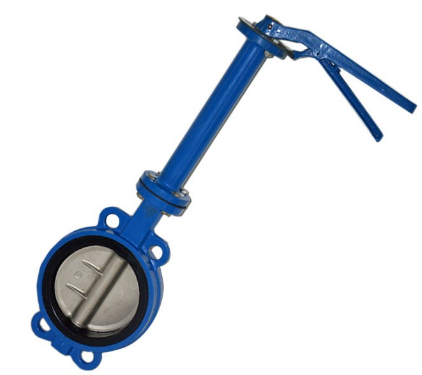
What services do customers get when they purchase Extension Stem Butterfly Valve ?
- Stem lengths are customizable to suit varied space needs and installation setups, guaranteeing a precise fit for every unique application.
- Compatibility with manual, elektrisch, pneumatic, or hydraulic actuation is provided, thus facilitating flexible control options and seamless integration into existing automation systems.
- Safety Measures Enhanced: Easy access and remote operation capabilities are enabled, passively enhancing operator safety in challenging or restricted environments, thus reducing the need for hazardous interventions to a considerable extent.
- Space Efficiency Improved: The valve body’s detachment from the actuation mechanism is a solution that passively optimizes space usage, effectively eliminating any potential interferences with surrounding structures and simplifying system layouts.
- Maintain stable performance: The reliability of the standard butterfly valve has been retained.
- Flow control efficiency is not reduced: Fluid control efficiency is effectively ensured.
- Fast response times are set to be guaranteed.
- Durability meets demanding requirements:Even in harsh applications, long service life is achieved.
Concentric Disc Butterfly Valve: Precision Engineering for Optimal Performance
The concentric disc butterfly valve is characterized by its innovative design, featuring a concentrically mounted disc that ensures precise flow control and tight shut-off capabilities. This design minimizes turbulence and pressure drop across the valve, enhancing efficiency and reducing energy consumption. Ideal for applications requiring precise flow modulation and leak-free performance, the concentric disc butterfly valve is commonly used in oil and gas pipelines, power generation plants, and pharmaceutical manufacturing facilities.
Differences and Considerations:
- Material Zusammensetzung: While all three valves offer robust performance, the GGG50 butterfly valve is specifically constructed from ductile iron with a GGG50 material designation, providing enhanced corrosion resistance.
- Functionality: The extension stem butterfly valve offers extended reach for remote operation, making it suitable for applications where accessibility is a concern. In contrast, the concentric disc butterfly valve prioritizes precise flow control and tight shut-off capabilities, ideal for applications demanding high performance and efficiency.
- Anwendungen: Each valve variant caters to specific industry requirements. The GGG50 butterfly valve finds utility in applications with moderate pressure and temperature conditions, while the extension stem butterfly valve excels in situations where remote operation is necessary. The concentric disc butterfly valve is best suited for applications requiring precise flow modulation and leak-free performance.
GGG50, extended stem, and concentric disc butterfly valves offer unique benefits for fluid management. Detailed analysis of these valves reveals distinct functional disparities. When matched with particular system demands, the ideal valve is selected, enhancing system efficiency and performance.
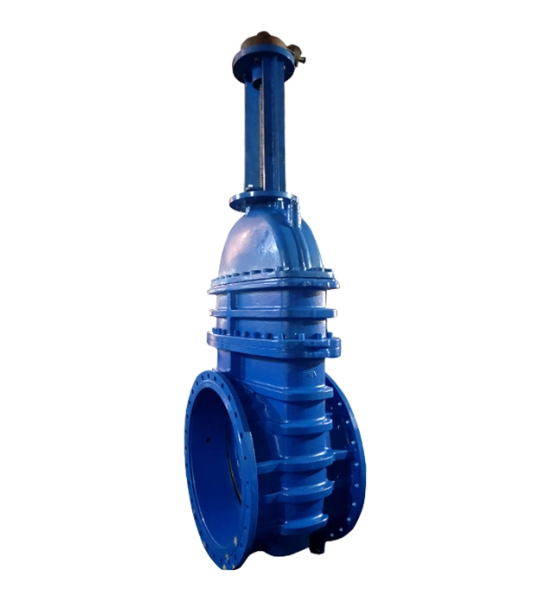
Apr 16, 2024 | Nachricht
Gate valves are critical to regulating fluid flow in many industries, and their efficient operation depends on careful maintenance. This guide describes maintenance methods and techniques for three gate valve categories: large gate valves, manual gate valves, and cast steel gate valves.
Basic introduction to Big Size Gate Valves
Big size gate valves, also called large diameter gate valves, are designed for handling voluminous fluid flows with expansive nominal diameters.These valves are essential in various industries like oil and gas transmission, chemische Verarbeitung, power generation, Wasserversorgung, mining, and infrastructure projects. They handle high flow capacities, pressure thresholds, and large pipe diameters.
Selection & Wartung
Selection:
- Selection Considerations:Working pressure, temperature, fluid properties, flow requirements, and more are considered.
- Installation & Commissioning: Strict specifications and manufacturer’s guidance are required for the installation of Big size gate valves. The valve must be correctly centered, firmly supported, and connections tightly sealed and leak-free. Functional tests and sealing tests are conducted during debugging to confirm that the valve moves flexibly, experiences no jamming, and maintains a good seal.
Wartung:
- Visual inspections should routinely be carried out to identify wear, corrosion, or damage on the cast steel gate valve.
- Suitable lubricants should be applied to the stem threads and sealing surfaces for friction reduction and smooth operation.
- Valve seals should be monitored and replaced as necessary to ensure sealing integrity and leakage prevention.
- The valve should be kept clean from debris or contaminants that might affect operation, using proper cleaning agents carefully.
- The valve’s functionality should be checked periodically, with issues like sticking or jamming addressed promptly to avoid damage.
Advantages of Manual Gate Valves in International Trade
- Adaptability to various environments: One of the characteristics of manual gate valves is their adaptability. Regardless of how adverse the conditions may be, these valves maintain their functional integrity, unaffected.
- Economic feasibility: In terms of cost management, manual gate valves are evidently favored. The initial purchase price of these valves is lower, and there is almost no energy requirement (as they do not need electricity to operate). Therefore, they can help reduce operating costs for businesses – an important consideration factor on the international trade stage.
- Ease of use and maintenance: The unique thing about manual gate valves is their simplicity.This simplicity ensures that repairs can be quickly carried out in the event of a malfunction, without the need for specialized equipment. Rapid repair turnover is crucial for preventing costly downtime in international trade operations.
- Independence from power sources: The benefits of valves that can operate without a power source cannot be underestimated. In areas with unstable power supply or frequent power outages, manual gate valves ensure the continuity of operations.
- Simple operation: Operating manual gate valves does not require extensive training or technical knowledge, making them suitable for a broader workforce. In an international context, this means fewer barriers for personnel interacting with these valves, thus making operations smoother.
- Long-term reliability: Manual gate valves are praised for their longevity. They are typically made of sturdy materials like cast steel, enduring the test of time and consistently fulfilling their duties.
- Enhanced security: In an era where digital threats are increasingly pronounced, the manual nature of these valves circumvents vulnerabilities associated with automated systems. Due to the need for physical operation, manual gate valves can effectively prevent network intrusions that might otherwise disrupt trade processes.
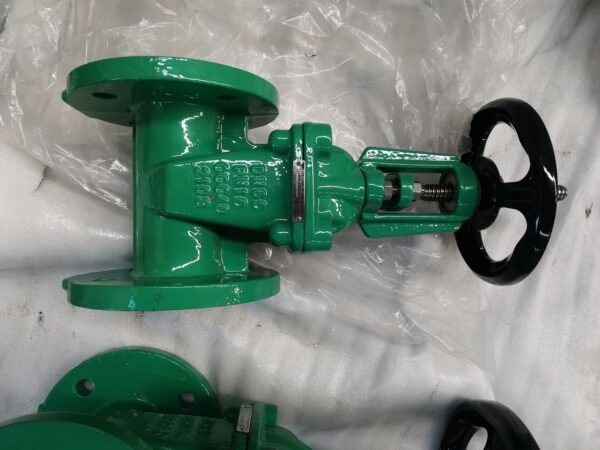
How to Maintain Manual Gate Valves ?
- Valve handles should be inspected regularly for wear, ensuring smooth operation and secure attachment.
- The packing gland should be checked and adjusted periodically to prevent stem leakage through proper compression.
- The valve body and parts should be coated or treated with anti-corrosion substances, especially when exposed to harsh elements.
- Valve stem and packing should be lubricated to ease operation and reduce friction, using condition-appropriate lubricants.
- Seals should be replaced when necessary to ensure ongoing sealing effectiveness and to guard against leaks, with material consideration for specific fluid and thermal demands.
Introduction and Repair of Cast Steel Gate Valve
At the heart of industrial fluid control lies the cast steel gate valve, a device synonymous with strength and precision. Built to withstand the rigors of high pressure and temperature variations, these valves are the cornerstone of heavy-duty industrial applications, from steam distribution in power plants to flow control in oil refineries.So how to make cast steel gate valves last longer? The following are some ways to maintain cast steel gate valves to extend their service life:
- Valves and their components should be observed for corrosion signs, with protective measures applied to ensure longevity.
- Inspections of the valve stem should be conducted regularly, with any abnormalities remedied quickly for uninterrupted functioning.
- Integrity checks, in the form of pressure tests, should be periodically undertaken to uncover any sealing flaws or leaks.
- To preserve performance, components like seats and discs must be replaced with authentic parts when wear is detected.
- Valve operations should be checked consistently, noting and addressing any unusual sounds, vibrations, or resistances.
By adhering to these maintenance guidelines tailored to big size, manual, and cast steel gate valves, industries can ensure the reliability, efficiency, and safety of their fluid control systems, prolonging the lifespan of these critical components and minimizing downtime. Remember, regular maintenance is key to maximizing the performance and longevity of gate valves in industrial operations.
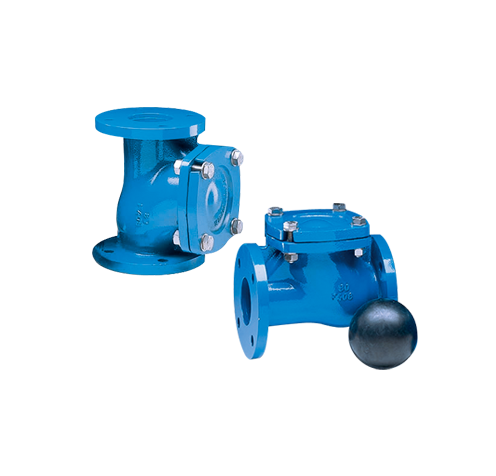
Apr 13, 2024 | Nachricht
Wafer Dual Plate Check Valves: These little marvels are like the traffic cops of fluid flow. These nifty valves are efficient, reliable, and essential for maintaining optimal performance and system longevity. In this guide, we’ll explore the key factors to consider when selecting the best wafer dual plate check valve for your needs.
Understanding Wafer Dual Plate Check Valves
Imagine these valves as the gatekeepers of your fluid system. They go by different names—wafer double door check valves or dual plates check valves—but their purpose remains the same. Here’s the lowdown:
- Compact and Lightweight: Wafer dual plate check valves are like the minimalists of the valve world. They’re designed for tight spaces, making them ideal for applications where real estate is at a premium.
- Two Halves, One Mission: Picture two halves (plates) that swing open when fluid flows forward. But when the tide turns (literally), they snap shut, preventing any sneaky backflow. It’s like a synchronized dance routine, but for valves.
Key Considerations for Choosing the Right Valve
- Flow Rate and Pressure: Let’s talk numbers. First, assess your system’s flow rate and pressure requirements. You want a wafer dual plate check valve with a pressure rating that comfortably exceeds your system’s operating pressure. Safety first! Also, keep an eye on the flow coefficient (Cv)—it’s like the valve’s flow capacity report card.
- Material Matters: Think of your valve as a chameleon—it needs to blend in with its surroundings. Consider the fluid it’ll be handling and the environment it’ll live in. Edelstahl, carbon steel, cast iron, and various alloys are common materials. Ask yourself: Is it corrosion-resistant? Can it handle extreme temperatures? Will it play nice with the chemicals in the mix?
- Size and Fit: Size matters, especially when it comes to valves. Measure your pipe diameter and understand your flow requirements. Wafer dual plate check valves fit snugly between flanges, no extra pipe support needed. It’s like finding the perfect puzzle piece for your system.
Wafer Dual Plate Check Valves: Your Fluid Flow Guardians
In the intricate world of industries, there’s a silent hero—the wafer dual plate check valve. These unassuming valves keep the fluid traffic moving in the right direction while firmly saying “no” to any sneaky backflow. Here’s why they matter:
- Efficiency and Reliability: Think of them as the backstage crew—essential but rarely in the spotlight. These valves quietly ensure optimal performance and system longevity. No drama, just results.
- Compact and Mighty: Picture a tiny superhero. That’s the wafer dual plate check valve. It fits snugly where space is tight, making it perfect for cramped setups.

In our guide, we spill the beans on how to choose the best wafer dual plate check valve. TWT Valve always can manufacture the high quality product word-widely.









